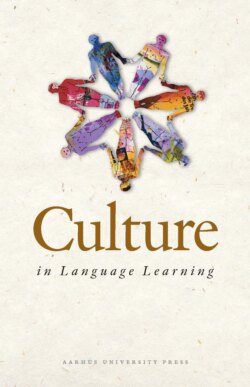Читать книгу Culture in Language Learning - Группа авторов - Страница 12
На сайте Литреса книга снята с продажи.
2.2.1 Culture as Discourse
ОглавлениеDrawing from post-modern theories of the multiple, conflictual, changing subject of our post-structuralist times and from the ‘dialogic turn’ in cultural theory, culture has become equated with what James Gee calls ‘Discourse’ with a capital ‘D’, i.e., “ways of using language, of thinking, feeling, believing, valueing, and of acting that can be used to identify oneself as a member of a socially meaningful group or ‘social network’” (Gee 1990: 143). Discourses, as identity kits, are inherently ideological, in the sense that they lead people to put forward certain ideas and values at the expense of others. Because they are the products of history, they are related to the distribution of social power and hierarchical structure in society. For example, the distribution of tu and vous in French everyday discourse reflects changes in social structure in various periods of French history. The tu of solidarity, that was common during the French revolution and the revolution of May ‘68, became generalized among students, army comrades and young adults in the democratic France of the seventies and eighties, but the hierarchical vous has recently surfaced again as a sign of distinction in the economically competitive France of the turn of the century.
This view of culture establishes a much closer link between language, thought, and culture than in the modernist conceptions (Kramsch 2004). Culture as Discourse introduces the notion that every utterance is embedded in asymmetrical relations of power between communication partners, that culture in the form of language is embodied history, and that the meaning of this history is constantly renegotiated through language. For example, there have been various terms to denote those who oppose existing political regimes. The French who opposed German occupation during World War II were called ‘resistants’ by the French, ‘saboteurs’ by the Germans; the Iraqis who oppose the American occupation are called ‘insurgents’ by the Americans, ‘guerillas’ or ‘martyrs’ by the Iraqis; in Guatemala opposition to the regime was led by ‘rebels’ if you were on the side of the government, ‘freedom fighters’ if you were on the side of the opposition. The use of one or the other term said something about the political leanings of a newspaper and its readers. By placing culture squarely in Discourse, post-modernists have linked an individual’s membership in a culture to his/her social and political identity.
